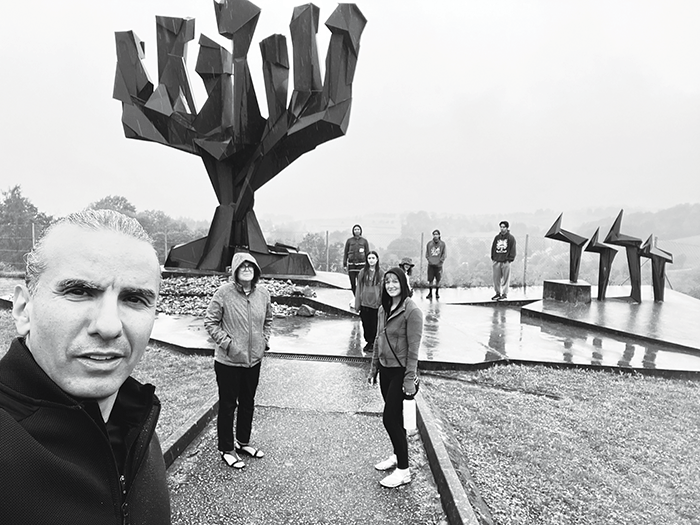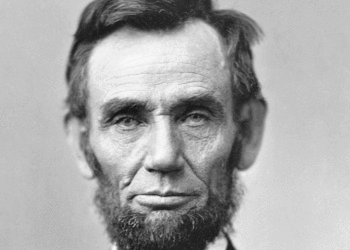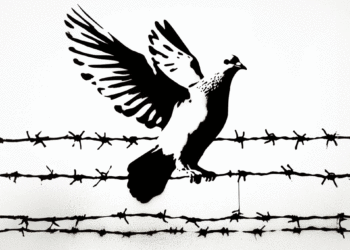By ANTON TREUER
I miss my father’s smile, the leather of his hands, the warmth of his eyes. I always marveled at his ability to find joy, to seek and love his fellow human beings, after everything he and the rest our family endured in surviving the Holocaust.
The traumas he endured were real — being chased through the alleys of Vienna by armed Hitler Youth, watching his mother being forced at gunpoint by SS to scrub the streets, escaping in 1938, some months after the Anschluss, but seeing nobody he knew for months until his parents retrieved him in Ireland in 1939, and coming to America to start a new life. Only three other family members survived. Robert Treuer passed away in 2016 and had 26 grandchildren at the time.

Every time one of his grandchildren was born, he trumpeted to the world, “Another victory over Hitler!” He showed me how a man can and should love his kids. What a gift he gave me. I use this gift every day. It’s one of the best parts of me.
Trauma can ripple through generations. Both the epigenetic imprint of family trauma and the coping mechanisms we develop to deal with it can leave scars of their own. Healing can ripple through generations as well, but it doesn’t always come easy. Here is what I learned on my Shoah sojourns.
My father restarted his life a number of times in America — working at his mother’s Viennese bakery in Ohio, serving in the U.S. Army toward the end of World War II (stationed in the Philippines), and working as a labor union organizer in Wisconsin, a high school teacher in Minnesota, and for a number of offices in the U.S. government, including the Bureau of Indian Affairs. That’s when he met my mother, Margaret Treuer.
She was born and raised on the Leech Lake Reservation in northern Minnesota. Her mother was taken from her parents and sent to residential boarding school like many Indigenous children of her generation. My mom’s family had traumas too, although they were different from Dad’s family’s. There was mass murder, a war on tribal cultures and terrible poverty. One of the threads that ran through all of my father’s experiences and restarts was that he could tolerate no injustice to any marginalized group. He fought for justice in each place he set roots. It was part of the way he faced his pain as a Shoah survivor.
In 1986, I accompanied my father on his first trip back to Austria after he fled in 1938. He spoke German with his mother throughout his adult life, but when he got off the airplane in the German-speaking world, he had a panic attack. His courage in the face of everything he must have been feeling became even more evident to me as I got older. He took me to Mauthausen. My grandfather, Fritz Treuer, used to hike and climb the Austrian Alps, and his good friend and climbing partner was murdered at Mauthausen.
We went to Dachau, too. And we visited the places my father called home for the first 13 years of his life. He broke down in tears a few times. I was 17 then, and I mainly felt anger. The descendants of the Nazis might have to learn about this history, but they got to live and have descendants. My father was the only member of his entire family to have grandchildren. There was just no way to make it right. I cherish the cousins I do have on my dad’s side of the family, but I should have so many more.
I can see now that anger was a natural response on my part. It is easier to be angry than it is to deal with everything else. It was hard for me to see then that the anger was a prison of its own. It put me into judgement. I kept telling myself that Germans and Austrians were “bad people.”
I didn’t return to Austria until the summer of 2022. This time, I brought many of my own children. I showed them the Karl Marx Hof, where my grandfather, Fritz Treuer, and others protested the fascist takeover in Austria in 1934, four years before the Nazi Anschluss. We visited the Volksschule where my dad went to school. We walked from there to my grandfather’s former store, which was still standing and my dad’s former home, which was also still there, though remodeled. I took everyone to Bad Aussee where my dad and his parents used to spend their summer vacations, hiking and enjoying the alpine lakes.
Though all of these places were still there, they were confiscated from our family and given to Aryans who own them still. What should have been a family inheritance was now a historical reminder. We also went to Mauthausen and Dachau.
And we went sightseeing throughout Austria. We connected with friends there. One couple in particular stayed in Minnesota for a year and spent time with my father and me, even doing interviews on my dad’s Holocaust experiences. They opened their home to us in Kirchbach and took us hiking on the Austrian-Italian border. My children had an especially wonderful time with them and were impressed by their generosity — of time and spirit.
Over dinner one evening, one of our hosts shared that almost everyone in Austria has at least one grandparent who was a Nazi. For our hosts, all of their grandparents were Nazis. One set of the grandparents were unrepentant Nazis. They thought the Nazis did nothing wrong. Our hosts shared that none of the grandchild generation in their families shared that view.
It took some reflection for me to process everything. Our hosts were so kind, so generous with their time, so open and honest about their family. My children enjoyed their laughs and personalities and efforts to show us Austria. It was hard for me to adopt the disposition I had on my first trip to Austria with my father — anger and judgement.
I could see and appreciate in a new way the beauty of Austria, its people and culture and still see everything it did to my family and so many others. That helped move me out of judgment to a more nuanced and honest view of that place and our family’s experiences there. I found forgiveness, which is not saying that what happened was ok, but simply that it happened and I accept that it happened. It may be a relief for Austrians and Germans that I hold less judgment toward them, but the greatest gift was to me and my family — not to carry so much anger. It’s a heavy and taxing burden. On my second Shoah sojourn, I found some measure of healing.
This experience has helped me gain perspective on other injuries and traumas in my family, including the experiences of my mother’s Native American family with residential boarding schools and, in earlier generations, dispossession, forced assimilation and mass murder. Healing, I learned, is not just an experience we stumble upon, but a rejuvenating practice. Trying to walk in my father’s footsteps has brought me closer to my now deceased parents and grandparents, and closer to my children as well. I do my best to keep walking that walk with high hopes that the healing can ripple forward for generations to come.
***
Anton Treuer (pronounced troy-er) is professor of Ojibwe at Bemidji State University and author of many books. A revised and expanded paperback edition of Everything You Wanted to Know About Indians But Were Afraid to Ask will be published by Minnesota Historical Society Press this month. Treuer’s equity, education and cultural work has put him on a path of service around the nation and the world.
(American Jewish World, April 2023)




















